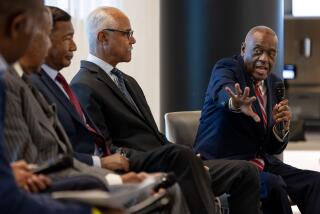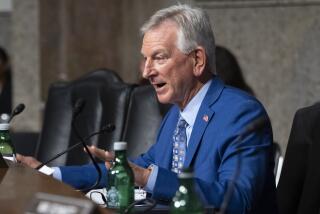An increasingly politicized military
It is tempting to compare Army Gen. Stanley A. McChrystal’s criticism of Obama administration officials to Gen. Douglas MacArthur’s defiance of President Truman during the Korean War. But something important has changed over the last 60 years. Although MacArthur challenged Truman, the larger officer corps was then thoroughly committed to principles of civilian control. But today, McChrystal’s actions are symptomatic of a broader politicization of the military command.
During the early 20th century, strict nonpartisanship was the professional norm. The overwhelming majority of officers even refused to vote since this required them to think of themselves as partisans for the time it took to cast a secret ballot. As late as 1976, 55% of the higher ranks (majors and above) continued to identify as independents.
Vietnam marked a decisive change. With leading Democrats challenging the Cold War consensus, party politics began to threaten key military interests, and many officers began abandoning their detached stance. With the political rise of Ronald Reagan, the top rank of the officer corps moved from 33% Republican in 1976 to 53% in 1984. By 1996, 67% of the senior officer corps were Republicans, and only 7% were Democrats — the basic pattern continued through 2004.
If we look to the service academies, the future promises more politicization. A West Point survey taken in the run-up to the 2004 election indicates that 61% of the cadets who responded were Republicans, 12% were Democrats and the rest were independent. Almost half of the cadets said that “there was pressure to identify with a particular party as a West Point cadet.” While Republican cadets tended to minimize this pressure, other cadets disagreed. Two-thirds of non-Republicans affirmed its existence, as did four-fifths of the small minority who identified themselves as Democrats (in a confidential survey).
Increasing partisanship places obvious pressure on the fundamentals of civilian control. But the officer corps doesn’t have a firm grasp of basic principles. Studies over the last dozen years suggest that “a majority of active-duty officers believe that senior officers should ‘insist’ on making civilian officers accept their viewpoints”; and 65% of senior officers think it is OK to go public and advocate military policies they believe “are in the best interests of the United States.” In contrast, only 29% believe that high-ranking civilians, rather than their military counterparts, “should have the final say on what type of military force to use.”
Viewed against this background, it is hardly enough for President Obama to insist on McChrystal’s resignation. He should take steps to invite the officer corps to rethink constitutional fundamentals. By all accounts, the curricula of the service academies and the war colleges give remarkably little attention to the central importance of civilian control. They do not systematically expose up-and-coming officers to intensive case studies and simulations designed to give them a sense of the principle’s real-world implications.
This should be the aim of a canon of military ethics. Like the comparable canon of ethics for judges, it should presume that the officer corps is dedicated to the principles of constitutional government, but that these principles require clarification in the modern world. The primary aim should be the elaboration of context-sensitive guidelines for good practice, not to identify conduct for criminal punishment.
Defining the new canon cannot be the exclusive preserve of the military. The guidelines would have implications for civilian policymakers at the Pentagon, in the White House and on Capitol Hill. Real progress requires both civilian and military leaders to engage in a sustained effort at developing a realistic code of conduct.
The best way forward is through a presidential commission on civil-military relations. Leadership from the White House would signal the importance of the project and encourage the recruitment of top people. It would also suggest the right time frame for action: not a few months, not a few decades, but a couple of years of sustained discussion leading to a concrete proposal — which the president, as commander in chief, would then put into effect.
This ongoing project would serve as a fundamental response to the accelerating politicization of the military. The canons would provide the officer corps with something more than a set of practical guidelines. It would provoke a deeper reorientation to the entire question of civilian control. Through its active participation, the officer corps would be working with civilian society to construct a new military ethos.
Bruce Ackerman, a professor of law and political science at Yale University, is the author of the forthcoming book “The Decline and Fall of the American Republic.”


